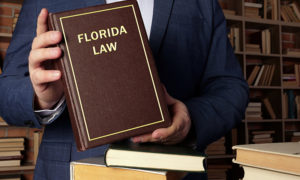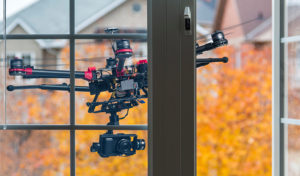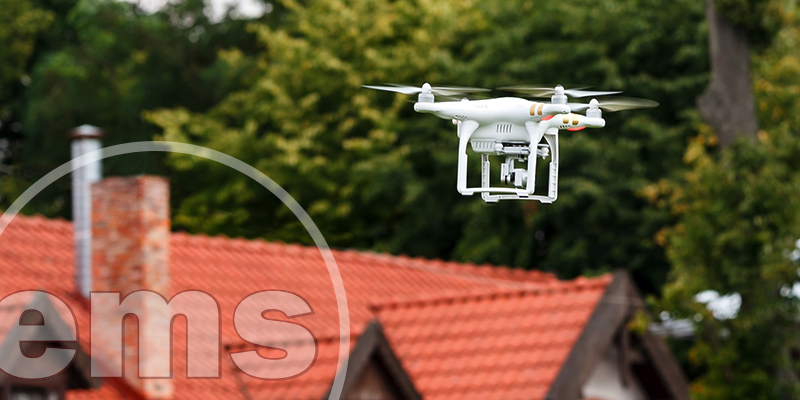Drones in HOA communities are becoming more and more common, but these unmanned aircraft can pose serious concerns among residents. The first step in managing drones in your HOA is to know what the law says about them.
The Use of Drones in HOA Communities
Hobbyists make up most of today’s drone pilots. For many, the simple act of flying an aircraft is enjoyable, similar to radio-controlled airplanes. But, hobbyists are not the only ones who have an affinity for drones.
These unmanned aircraft are used in a wide array of fields. For instance, photographers use drones with built-in cameras to capture amazing scenic shots. The same goes for videographers.
Real estate agents have taken advantage of drones, as well, using them to market and sell properties. In the agriculture sector, farmers use drones to spray their crops remotely.
Homeowners associations can also benefit from drone use. Communities with common areas covering an extensive range can use drones for better observation. Drones can cover more ground in less time.
Additionally, drones in HOA communities can also be used to inspect properties. This is a much less invasive way of examining covenant violations.
Drones also give you a chance to check hard-to-reach areas such as roofs and balconies. Apart from that, communities can use drones for security measures.
What Does the Federal Law Say?
 Drones definitely offer many uses, ranging from photography to no-contact inspections. But, what does the law say about drones in HOA communities? Is it even legal to fly drones in a public space? Do you need a permit for that?
Drones definitely offer many uses, ranging from photography to no-contact inspections. But, what does the law say about drones in HOA communities? Is it even legal to fly drones in a public space? Do you need a permit for that?
The Federal Aviation Administration (FAA) regulates all aircraft and air travel, including drones. However, drones are a relatively new technology in the aircraft industry. As such, when drones first came out, the FAA had no existing drone laws.
Now, the FAA is trying to match the pace of drone advancements, churning out new regulations largely targeted at amateur and commercial drone pilots. These regulations fall under the Small Unmanned Aircraft Rule, otherwise known as Rule 107.
This rule covers both the recreational and commercial use of drones. It recognizes hobbyists as those with drones weighing under 55 pounds who use them exclusively for enjoyment. Commercial use, on the other hand, refers to drones used for any purpose other than recreation. Therefore, if your HOA uses drones for inspections, it falls under commercial use. Conversely, residents who fly drones for fun are considered hobbyists.
FAA Regulations for Hobbyists and Commercial-Use Drones
Other than weight, hobbyists must abide by a few FAA drone regulations, such as:
- Must be at least 13 years old
- Should register their drones with the FAA
- Drones must not travel faster than 100 miles per hour or fly over 400 feet
- Can only fly during daylight hours
- Must not only within five miles of any controlled airspace (with limited exceptions)
- Drones must remain in the pilot’s line of sight while in flight
- Must not fly over anyone not involved in the flight
- Must not fly under or within close proximity to covered structures
Like hobbyists, commercial-use drones must also follow FAA drone regulations, such as:
- The pilot must be at least 16 years old
- Must pass an examination to have a required remote pilot certificate with a small UAS rating
What Do State Laws Say?
While the FAA has imposed certain drone regulations, most of them are primarily geared towards the safe operation of drones. When it comes to privacy and other concerns, your association must look to state laws.
It is important to keep in mind that not all states have passed laws regulating the use of drones. However, a vast majority of states have either enacted laws or considered them.
For instance, according to Michigan’s Unmanned Aircraft Systems Act, drones may not be used to invade someone else’s privacy. Pennsylvania and Florida have enacted similar laws. In both Texas and Colorado, laws prohibit the use of drones for hunting purposes.
Common HOA Resident Concerns
 While HOA communities can certainly benefit from the use of drones, there are some unavoidable pitfalls associated with them. A common drawback is the drone invasion of privacy.
While HOA communities can certainly benefit from the use of drones, there are some unavoidable pitfalls associated with them. A common drawback is the drone invasion of privacy.
Residents are naturally worried about drones peeping Toms use. There is also a risk of drone operators using their aircraft to trespass on other residents’ properties.
Another complaint many HOA residents have is safety. It is easy to lose control of drones, especially when flown by amateurs. These drones can bump into various structures and even fall on other residents. When flown high enough, gravity can make a 55-pound drone inflict serious injury.
Apart from privacy and safety concerns, some residents may just feel that drones are a nuisance. Some models of drones make a loud noise that can disrupt peace in the community. Other residents may simply dislike the sight of drones flying around the neighborhood.
Insurance and Drone Liability Implications
Drones also pose a liability risk to homeowners associations. If a drone accidentally injures a resident or destroys property, the victim can claim negligence and take legal action against the association.
A good way to protect your association from such claims is to practice proper drone regulation in an HOA community. The same goes for when the association itself uses drones for official HOA business.
Associations must also obtain sufficient insurance coverage to safeguard themselves from drone liability. Ask your insurance provider about any policies that cover any resulting damages from drones. Make sure to include premise liability as well.
Creating an HOA Drone Policy
For homeowners associations, crafting HOA drone rules can come as a challenge. The rules must be strict enough to regulate the use of drones and protect residents without stepping on the interests of drone enthusiasts.
As the creation of most associations’ covenants predates the introduction of drones, many HOAs lack a sufficient drone policy. When creating your own, consider the following points:
- Be Specific. State, in detail, what drone owners can do, and when they can do it.
- Require Permission or Registration. Controlling drones in HOA communities is no simple task. To make the process easier, make it mandatory for owners to submit an application to the HOA board. The application must include all pertinent details, including the purpose of their drone, weight specifications, make and model, and the dates and times of intended use. The application must also legally bind the owner to follow your HOA drone policy and reimburse the association for any resulting damages.
- Require Insurance. Make it known that all drone owners must have insurance covering any damages from drone use. Ask them to submit a proof of insurance, specifically for drone liability, with the application.
- Give Warnings. This should appear in the application form, but it is still a good idea to remind owners that they must shoulder all damages resulting from their drone use. Let them know that your board will not hesitate to report them to the FAA should they practice unsafe operations.
When crafting your HOA drone policy, make sure it does not come into conflict with existing federal and state laws. Otherwise, your policy may be deemed unenforceable. Ask your HOA attorney for help.
Adapting for the Future
Drones in HOA communities are not new. And with retail giants like Amazon promising the use of drones for delivery in the near future, it definitely looks like drones are here to stay.
Instead of banning drone use outright, an HOA must look at both sides of the coin. Consider the laws of the land and then create your own HOA drone rules for the community. This is the best way to strike the right balance between protecting the interests of drone owners and the rights of HOA residents.
Many associations seek professional help when it comes to regulating drones in HOA communities. If you would like to follow in their footsteps, you may contact us online, email us at help@emspm.com or call us at (855) 238-8488.
RELATED ARTICLES:
- Dealing With HOA Violations For Homeowners
- 5 Things You Need To Understand When Looking For HOA Insurance Services
- How To Balance HOA Regulations With Holiday Decorations






